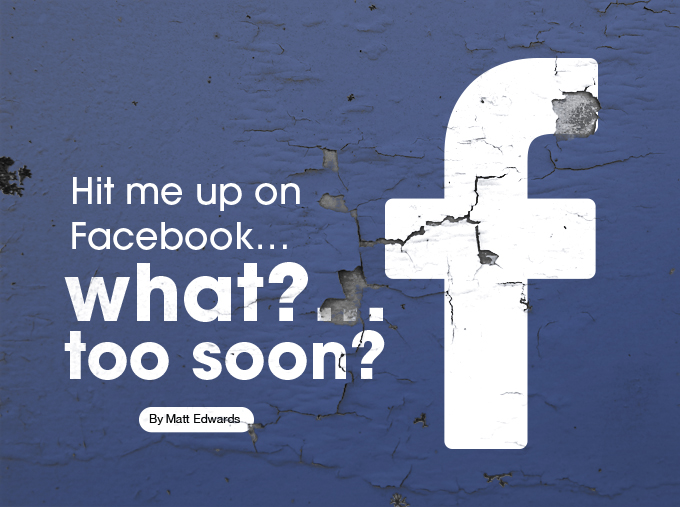For all the news surrounding Facebook over the past few weeks, I thought I would spare everyone the rehashed news and details surrounding the Internet’s latest scandal. However, in light of what has transpired, I thought it best to spark a different conversation surrounding personal data and the now inherent responsibilities that our collective social fabric entails.
Traveling all last week and living in hotel rooms led me to do something I rarely do, if ever: I watched the morning network news, with the usual collection of three to five newspeople drinking their coffee on air and arguing over the day’s latest gossip news. It was at this point that I saw something that provoked this article: a tutorial for Facebook users regarding privacy settings and how to manage the information they post.
Now, I admit I live in a different world. Being in charge of corporate operations—and overseeing the security measures in place that pertain to our own data, our customers’ data, and more—means that my level of jaded mistrust perhaps comes to light a little more often than it does with my colleagues, friends, and family.
In this case, however, I thought to myself, “In this day and age, who doesn’t understand the importance of personal data privacy and how to manage it?” But, I then realized that because of my job, my insight regarding data far exceeds that of many of my friends and that my own personal feelings toward this matter are skewed.
The fact of the matter is, for every photo, post, check-in, and friend request that happens in the world, most people, by nature, trust the infrastructure they use. And rightfully so. After all, Facebook and every other social media company in existence has an obligation to keep their users’ data safe—right?
You’d think that would be the case; however, in this instance, the differentiating factor is the user agreement and what that means in the grand scheme of business. For Facebook, membership is free. Since no one is paying for the service, the company has little to no obligation to its “customers.” In fact, signing up for something like Facebook means we have all agreed that we are the product—not the customer.
The monetization—on a global scale—of our collective social data is how Facebook makes money. The advertising they sell, the data they cultivate, are all highly interconnected.
Think like a marketer, for a moment. In the old days, magazine and radio ads, for example, were distributed on a “one-to-many” basis. The idea was that these masses would be synthesized down as conversions (sales) took place. So it’s not surprising that this spray-and-pray practice had to evolve. And so it did. Now, these same marketing messages can be delivered on a one-to-one basis by leveraging personal data to ensure the right person always gets the same message at the same time.
I am not saying anything others haven’t said before, but it’s the implications of what happens with the information we give up—to Facebook and beyond—that I think needs to be better managed.
When you drill down into platforms like Facebook, one need only think of the depth of data that we, as a society, willingly give up every day. We tell the machine (and it is a machine) our likes, our dislikes, our relationship status, our religious views, our political leanings, what music we like, where we live and have lived, where we work and have worked, where we travel, the restaurants and stores we like, who our friends and family are—the list goes on and on. And, even beyond social media, how many times have you been asked for your zip code, email, or phone number when trying to buy something? Chances are, it’s happening more and more.
And every data point we provide is used to create behavioral models that are leveraged by all types of organizations: B2C, B2B, political, or otherwise.
The question that we all need to ask ourselves is: Are we OK with having less and less privacy regarding our personal lives? For many, the idea of getting only highly personalized content is far better than the old-school spray-and-pray practices of the past. After all, personalized is always better . . . right?
Others, however, may have the mindset that people know too much already and that data needs to be kept away from prying eyes and machines.
In either case, it really comes down to personal preferences—and the resulting personal security preferences set up by the social platforms that we all collectively use every day.
In terms of what Inteleca does, we see data growing exponentially every day—that’s not going to stop. Data centers are constantly investing in more and more optical networking equipment to handle the amount of data being created. Storage and backup are at an all-time high, and Internet and wireless speeds are set to increase yet again in 2018. All of this is due to our world shaping our daily practices just to keep in step with everyone else.
My only word of advice is to always maintain due diligence. Manage your data and your expectations and consciously debate the outcomes of sharing your life online.
Now . . . I wonder how many “Likes” I’ll get?



